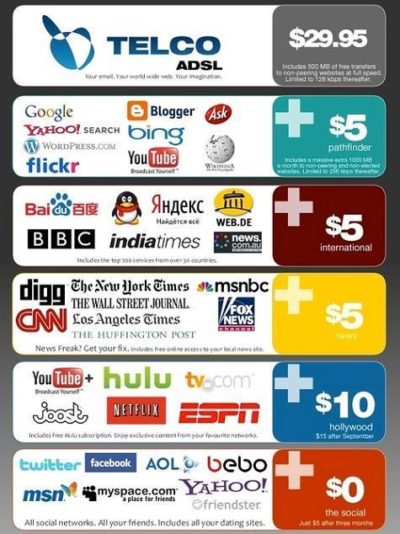May 18, 2017 is a date that could be a landmark in the history of the internet. This is the date that the FCC led by chairman Ajit Pai, voted 2-1 to change the rules of Net Neutrality or to put it in his words, “take a weed whacker” to them. Net neutrality has been hotly contested by various groups and has been making many headlines of late. The argument is complicated because it relies upon an understanding of technology, politics, and economics. There is a lot of political tension already and thus it is difficult to get a clear answer from any source. When looking at one article, there is another one that completely contradicts it. There has been a lot of fear-mongering and shady practices to either misconstrue or mislead the masses on the issue. Hopefully, this article will shed a proper light on the subject.
What is Net Neutrality?
Aside from having a terrible name, it stands for “network neutrality.” It is a practice of prohibiting Internet service providers (ISP) the ability to restrict the transmission of content. In other words, it’s supposed to stop Verizon, AT&T, and Spectrum from preventing you from watching Netflix because they want to.
Okay, it is a lot more complicated than that, but that is one example.
Net neutrality came about from the Federal Communication Commission’s (FCC) Open Internet Order of 2015. This order changed the status of the Internet from Title I to Title II under the Telecommunications Act of 1996. Title I had labeled the internet as an information provider which gave ISPs more freedom and they only really had to answer to the Federal Trade Commission (FTC). Title II labels the internet as telecommunications which means it is a public utility under the direct jurisdiction of the FCC.
What does net neutrality do?
The Open Internet Order instills the Bright Line Rules which prohibits three actions of ISPs: blocking, throttling, and paid prioritization.
No blocking prevents ISPs from completely shutting down access to lawful sites that they just don’t agree with.
No throttling prevents ISPs from intentionally slowing down Internet traffic to lawful websites.
No paid prioritization prevents ISPs from making lawful websites have faster internet traffic than others as of a result of the payment. Essentially no “fast lanes.”
Without these rules, ISPs could cater to certain sites that pay them extra fees or have a financial stake. They could make them have faster service to users and slow down the competition or companies that refuse to pay extra. Going back to the Netflix example, in all honesty, they are big enough company to pay the extra fees. The biggest issue with them is that their fees will most likely increase for the consumer. Although the issue is with other smaller Internet companies, if they cannot afford to pay the extra fees or if they are somehow in competition with the ISPs then they could be blocked or throttled.
Why does the FCC want to change the rules?
The main proponent of the change is the FCC chairman Ajit Pai who is a recent Republican Trump appointee and former Verizon lawyer. He has recently released a Notice of Proposed Rulemaking (NPRM) which is a set of rules that the FCC is planning on invoking to eliminate net neutrality. In the NPRM, he has been arguing that the current rules have been stifling to the ISPs economically and that it has even prevented broadband investment in communities. He points out a 5.6% drop in U.S. broadband capital investment by major ISPs between 2014 and 2016. Although, as USA Today reports, the issue is a lot more complicated than what is presented. The report mentions that the drop is mostly due to AT&T’s lack of investment and a possible reason is that the company recently bought Directv. The report also mentions that twenty-two smaller providers complained about the inability to get financing to expand. AT&T still argues that net neutrality was the cause but Tuna Mobi, equity analyst for CFRA Research, stated that it could be gesticulation on their part to fight regulation. He also mentions that competition is too high for companies not to invest.
Another argument that Pai makes is that net neutrality did not exist before 2015 and that the internet functioned well during that time. The issues that the net neutrality advocates raise are based on largely on speculation. For the most part, he is correct. Net neutrality is fairly new and the internet has been around for quite a while. However, the complications arise in that the speculations have genuine merit because there is evidence that ISPs have participated in questionable behavior.
AT&T got in trouble with the FCC and FTC for intentionally slowing down data for their unlimited plans. They have also intentionally stopped Skype from using their networks on iPhones until they gave into pressure from the FCC. Comcast also participated in controversial behavior by blocking some internet traffic to BitTorrent and when they slowed down data to Netflix.
What has been the public response?
If you look at reputable news organizations then you are probably already aware of the public outcry that mounted against the recent decisions of the FCC. Over 2 million comments have been made and most of them are in favor of net neutrality. Arguably most of the response was a result of the John Oliver video below:
The video does a nice job of listing most of the complaints of net neutrality advocates. It discusses how it will give too much power to a limited number of ISPs and how the consumer and websites will be at the whim of ISPs. However, the video did not mention the fears of independent news organizations. Progressive channels like The Young Turks and The Humanist Report have been the most vocal by discussing how mainstream media could gain more influence by slowing down or blocking independent news. The idea is that the parent organizations of CNN (Time Warner) or MSNBC (Comcast) could interfere with the internet traffic of the smaller and less influential competition. Again, these ideas are still speculative.
Aside from the public outcry, Google, Netflix, Amazon and 800 startup companies along with special interest groups like the ACLU, Greenpeace.org, Moveon.org, Free Press and Public Knowledge have all voiced their concerns about the overturning of net neutrality. The companies have lobbied and the interest groups have written a letter to combat these changes.The Hill reports on the arguments by the companies in that the changes to net neutrality can impact the economy and stifle innovation. Techcrunch reports on the contents of the letter, like how the rules support free speech, innovation, competition, and equal access to the internet.
There are other interest groups like the NAACP, MANA, National Urban League, and Asian Americans Advancing Justice that have taken a different approach in that they believe that the FCC should not be involved in the regulation of net neutrality. A letter signed by them and other civil rights groups, the Intercept, has touted the jurisdictional and classification problems of the FCC and they believe that a statute should be created which would rely upon Congress to implement. They state that this action would create a more permanent solution. The report also indicates that these civil right’s groups are heavily funded by the telecom industry. The letter itself was also released by the Multicultural Media, Telecom and Internet Council which is an organization that was created by the telecom industry. Net neutrality advocates state that the civil rights groups are doing exactly what the telecoms want because with a Republican-led Congress the laws will not favor net neutrality.
What has been the FCC’s response to the public outcry?
Well, Ajit Pai has released a video in the theme of Jimmy Kimmel’s Mean Tweets segment:
While the video does show a response to the public’s comments, it is done in a facetious and condescending way. By focusing on the vulgar, racist, and stupid comments, they negate the actual informed ones. He prefaces the video by stating that he “enjoys the public debate” that net neutrality espouses. It is then a flurry of offensive comments read by a giggling Pai who has a wide toothy grin ready to make humorous retorts. His attempt at nerdy comedic charm only reveals a deeper and more sinister personality in that he is telling the public that he does not take their concerns seriously.
On a more professional note, the Verge reports that senior officials have also not taken the majority seriously and have only made superficial changes to the initial proposal. One has even said that they are not concerned with the abundance of comments in favor of net neutrality but in the “quality” of the arguments, even going so far as to say that it was the way that the “Administrative Procedure Act works.” Having looked at the Administrative Procedure Act, it does say “the agency shall give interested persons an opportunity to participate in the rule making through submission of written data, views, or arguments with or without opportunity for oral presentation.” However, there is no indication of why the sheer quantity of comments should not make a difference or at least play a part in the rulemaking.
What is the current state of net neutrality?
It honestly does not look good. Even with the over 2 million comments, with the majority being in favor of net neutrality and polls expressing this same resound, the FCC and especially Ajit Pai seem pretty resolute in their decision. It has even come to light that thousands of the comments opposing net neutrality were actually bots as a result of identity hacking.
It is tough to say what the future will bring if net neutrality is gone. The Huffington post found a graphic years ago that conveyed a possibility:
While the fears of the smaller startups and independent media may seem unfounded, we need only look at the past. Television used to have a plethora of channels and news stations owned by various companies. Now only a handful of corporations owns almost all of them.
When looking at this debate it really feels like the battle of the oligopolies with Netflix, Amazon, and Google in one corner while Verizon, AT&T, and Comcast are on the other. With two groups of corporations going at it, it is tough to choose a side. Although, we again can look into the past and remember the experiences we had with telecoms:
What to do now?
The good news is that the recent vote was not to change the rules but whether the FCC should. There will be another vote in 90 days from the May 18, 2017, date and in that time the public is allowed to leave their comments. Maybe this time they will listen.
How to comment:
Instructional guide from Jake Kastrenakes
Where to comment:









